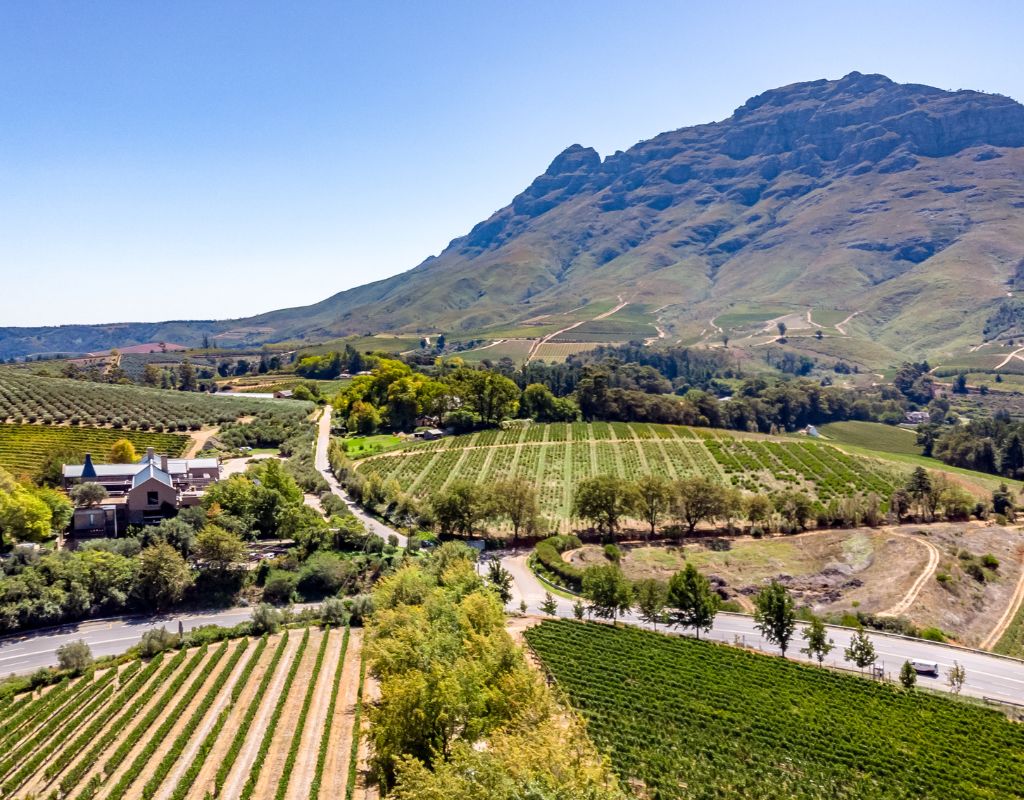Uncork the Best of South Africa With This 2 Week Itinerary
If South Africa isn’t on your bucket list, it should be. The country is unlike any other destination, with wildlife, beaches, cultural attractions, and wine tasting all at your fingertips. If you’re hoping to see the Big Five in the wild, sip Pinotage, and visit the stunning city of Cape Town, South Africa is for you.
This itinerary is structured as a 2-week trip with a luxurious tilt in mind, however, you can easily adjust the time frame to suit your budget and preferred length of travel. South Africa is relatively affordable, despite hosting sophisticated safaris and opulent vineyard hotels throughout the idyllic Cape Winelands. Follow the below tips and itinerary to make the most out of your trip.
IN THIS 2-WEEK SOUTH AFRICA ITINERARY:
- Travel Logistics
- Hotels
- Days 1 – 3 (Johannesburg)
- Days 4 – 6 (Safari)
- Days 7 – 9 (Cape Town & Penguins)
- Days 10 – 14 (Wine Tastings & Tours)
- More Luxury Things To Do
South Africa Travel Logistics & What to Expect
What to know before you go to South Africa
Check your passport
US citizens don’t need a passport to enter South Africa. However, they do need two completely blank pages in their passports upon arrival. If you don’t have this, you’ll be denied entry, so be prepared.
Safety
Although South Africa does have a high a high crime rate, staying in certain areas (and away from others) is an easy way to avoid issues. We suggest booking more upscale hotels and guided tours to ensure you won’t have any issues during your visit. A wide range of options are included further on in this travel guide.
Currency
South Africa uses the Rand. At the time of writing, 1 US dollar is equivalent to approximately 18 South African Rand. It’s a good idea to have local currency on hand, especially smaller bills for tips. However, due to safety concerns, it’s best to leave large quantities of cash at home or in the hotel safe.
Language
Although South Africa’s vibrant culture includes more than 10 different languages, English is widely spoken throughout the country, so you shouldn’t run into any major language barriers.
Food and drink
South Africa has a wide variety of cuisine, mainly based in meat, curries, and stews. While drinking water is safe in the major cities, you may want to stick with bottled water just in case, especially if you have a sensitive stomach.
Wine regions and grapes
South Africa has a number of wine regions, and most are clustered in and around Cape Town along the Western Cape, which makes exploring easy. Some of the most popular wine areas are Stellenbosch, Franschhoek, Paarl, and Constantia. While you’ll find a variety of grapes in these regions, make sure to sample South Africa’s signature Pinotage.
Getting to and around South Africa
Flying from the US
It’s a long trip between the US and South Africa, but there are a few nonstop options available. You can fly on United between Newark (EWR) and Johannesburg (JNB) or Cape Town (CPT), on Delta between Atlanta (ATL) to Johannesburg (these flights are around 15 hours). It’s also possible to have a layover in destinations throughout Europe, the Middle East, or Africa.
Getting around South Africa
South Africa is bigger than it looks. From destinations like Johannesburg or Cape Town, you may want to fly to the bush for a safari to an airport like Hoedspruit. Likewise, many luxury safaris offer private air transfer options to small landing strips near their camps.
You’ll also want to fly between Johannesburg and Cape Town. However, once you’re in Cape Town, you can easily reach the main wine regions by car within around 30 minutes to an hour. Car rental is easy as everything is in English. For exploring the West Cape and the Cape Peninsula, Cape Town is the obvious choice for a base.
You can browse flights in and out of any of these destinations, and get notified when flight deals arise here.
RELATED: 11 Proven Methods For Getting Cheaper Flight Tickets
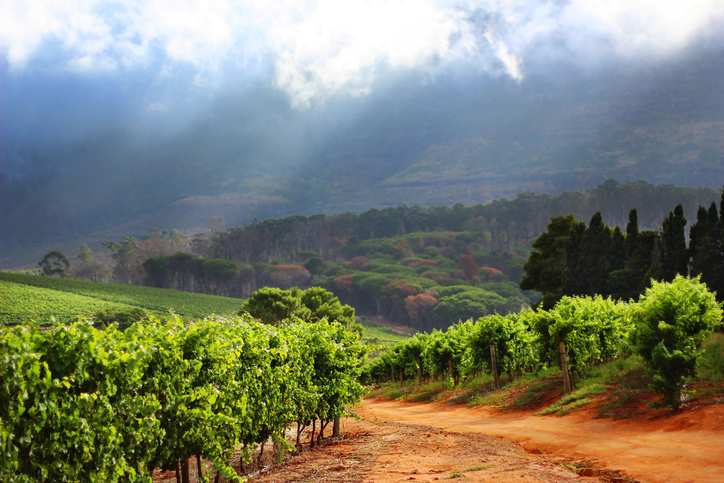
Recommended Hotels in South Africa
While South Africa has lodging options for every budget, we recommend making your trip a once-in-a-lifetime experience by splurging on accommodation. Safari options range from budget to luxe, but some of the best are the Singita Lodges. You can browse a range of luxury lodges right here. They’ll cater to your every need, offering guests the opulence of a five-star resort, but also incorporate the beauty and peace of the surrounding nature and game reserves. These are truly one-of-a-kind experiences you can’t find anywhere else in the world.
In Cape Town, the famous Silo Hotel overlooks the waterfront — and this grain silo-turned-hotel has some of the most beautiful bathtubs the Winetraveler staff has ever seen! Another option is the Mount Nelson hotel, a Belmond Hotel, which offers charming cottage-style accommodation.
If you choose to stay a night or two in Johannesburg, The Four Seasons Westcliff is set on a hill with breathing views of the city and beyond.
Best Luxury Vineyard Hotels in South Africa
Delaire Graff
This sprawling wine estate is one of the most coveted places to stay in Stellenbosch, thanks to its gorgeous lodge rooms with amenities like private heated plunge pools that overlook the region’s rolling hills, marble bathrooms, pillow menus, and original artwork. And when it comes to wine, the nearly 50-acre vineyard estate is on the Top 50 wineries list.
Leeu Estates
This Franschhoek winery estate features charming cottages complete with bespoke furniture, private terraces, and fireplaces. Guests receive one complimentary tasting per stay at the onsite Wine Studio.
Mont Rochelle
This stunning state features rooms named after popular wines, meaning you can lodge in a Shiraz Room or a Pinotage Suite. There’s also a separate Manor House, perfect for families or groups. From wine flights and tennis to dips in the pool and exploring the 100-acre grounds and vineyards, you’ll never get bored here.
Babylonstoren
With an onsite greenhouse and vineyard, Cape Dutch Farm Babylonstoren offers various lodging options within its farmhouse, cottages, or family houses. Stays include the usuals like breakfast and a wine tasting, but also extras like complimentary bicycle use, guided fishing, cellar tours, mountain drives, and selected workshops. The property even has an onsite wine museum.
READ: African Safari Planning Guide: 20 Tips To Prepare and Book a Safari
Days 1 – 3: Start in Johannesburg
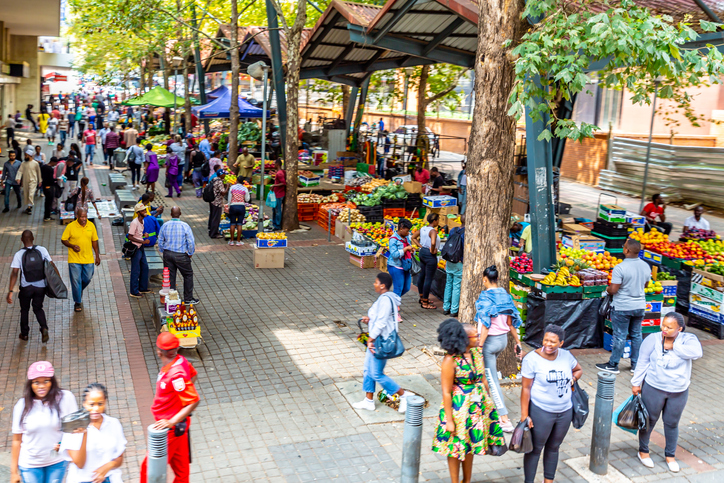
Johannesburg is often overlooked, but if you’re hoping to catch a glimpse of South Africa’s complicated past, spend a little time in the country’s capital city. This city was once considered to be a bit too hectic for a travel destination, with safety concerns often pushing tourists to skip it and head for Cape Town. This is no longer the case. In recent years, Johannesburg has become South Africa’s most affluent city, with many of its older structures being renovated and turned into vibrant marketplaces and art galleries. It’s also an ideal city to visit to sample a wide variety of African cuisine.
Visit the Neighborgoods Market (located in the Braamfontein neighborhood) on weekends for live music and some of the best examples of food across the city. Step back in time and visit the Apartheid Museum, one of the most interesting and unique cultural centers for understanding South Africa’s history. Wander the Maboneng district to see local street art and pop into any number of innovative cafes and restaurants for a bite. It’s also a great district to shop and experience some unique takes on nightlife.
For first-timers and one of the best ways to experience both Johannesburg and Soweto, take a full-day guided tour with our local friend Solly. The day trip is perfect for those who don’t know where to start and don’t want to have to worry about the logistics of navigating South Africa’s largest city.
Johannesburg is also home to the Gold Reef City theme park. This is a family-friendly place that offers a glimpse into the 1886 gold rush, while also providing unique amusement park rides like their rollercoaster which takes you through an abandoned gold mine. There’s also a casino and over 18 variations of rollercoasters to try.
About 50 kilometers north of Johannesburg, you’ll find what’s come to be known as the “Cradle of Humankind.” It was designated a UNESCO World Heritage Site back in 1999. Here, you’ll find limestone caves that are believed to have once housed some of the earliest humans, with archeological evidence going back over 3.5 million years. Tours are offered for a deeper dive, and include everything from boat rides to interactive museum exhibits and tours of the Sterkfontein Caves themselves.
Days 4 – 6: See the Big Five in Kruger National Park
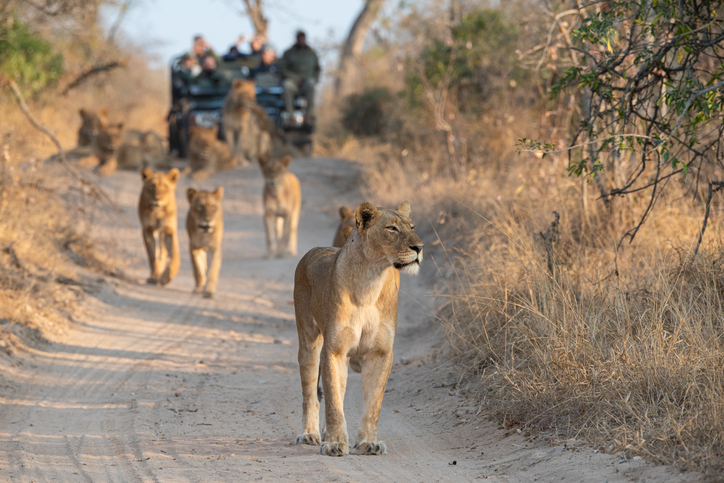
If you’re hoping to view lions, leopards, rhinos, elephants, and buffalos in their natural habitat, do a safari in Kruger National Park. Although you can see wildlife year-round, peak safari time is usually between July and October, dry season. Because there’s less rain, animals often congregate around watering holes, making them easier to spot.
Luxury, private lodges dot the perimeter of the park, and one of the most convenient ways to experience Kruger is to spend a few days at one of these lodges. Direct flights run daily out of Johannesburg, and last just about 90 minutes. Once you arrive at the park, lodge staff will meet you on the landing strip and take you right to your suite. Most Kruger lodges are all-inclusive experiences, complete with accommodation, safari trips, transfer, and transport services. For one of the ultimate luxury safari experiences, we recommend Lion Sands River Lodge.
If budget is a concern, self-driving is also an option. You can expect a 6-hour ride from Johannesburg to the park along a well-maintained road. There are plenty of gas stations and opportunities to safely stop, rest and refuel. If you don’t want to spend the night in the park, full-day private safaris are also offered.
Days 7 – 9: Cape Town for Culture and Nature
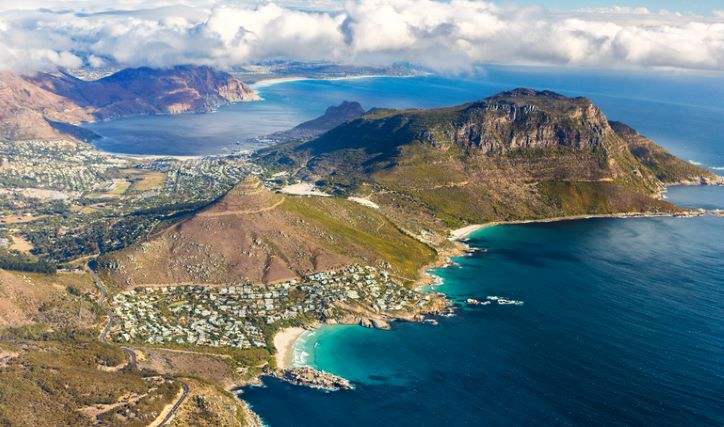
Cape Town isn’t just one of the most beautiful cities in South Africa. It may just be one of the most picturesque cities in the world! Its waterfront location with prime access to mountains, beaches, vineyards, and beyond makes it one of the best bases to explore the Cape Peninsula.
Once there, make sure to see all the main attractions. Ride around in one of the red tourist buses, hike to the top of Table Mountain, see the colors of the Bo-Kapp neighborhood, and wander the V&A Waterfront.
Nearby, pay a visit Robben Island to see where Nelson Mandela was once imprisoned. Beach lovers should hit the white sands of Camps Bay. And don’t miss the gorgeous Kirstenbosch National Botanical Garden, which has over 7,000 different types of plants, as well as a unique tree canopy walk.
READ: 10 Top Things To Do When Visiting Cape Town South Africa
Don’t forget about the African penguins
Just a short drive from Cape Town, you can see another very special kind of wildlife: African penguins. Boulder Beach is one of the best places to view them. Stroll around wooden boardwalks and between giant boulders to see these adorable animals go about their daily life. Watch and giggle as you observe the penguins eat, swim, waddle around, and hang out with their penguin friends.
If you want to see all of Cape Town’s highlights and experience some of the most scenic drives (and visit the penguins), this private tour is perfect for couples.
Days 10 – 14: Wine Tasting Experiences in South Africa’s Cape Winelands
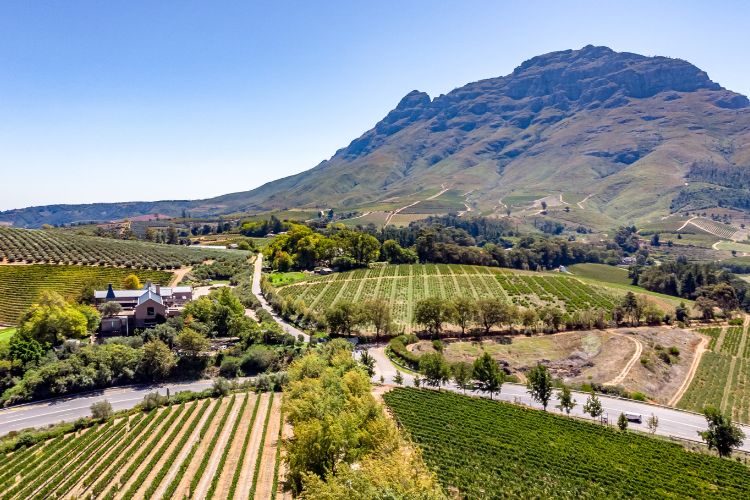
South Africa’s Cape Winelands is one of the best regions if you’re into wine tourism. The area includes world-renown subregions such as Franschhoek, Paarl, and of course, Winetraveler’s favorite, Stellenbosch. Spend the last 4 days of your trip exploring these 3 regions and beyond, and stay at the upscale Devonvale Golf & Wine Estate.
Stellenbosch is an easy drive from Cape Town. It’s close enough for a day trip, but also ideal for those wanting to escape the city and relax in the tranquil hills of the region for a few nights. With over 200 wineries, you’ll have plenty to choose from when it comes to wine tasting. And, you can even do a wine safari or wine picnic at wineries such as Waterford Wine Estate or Warwick Wine Estate. One of our favorite ways to see Stellenbosch is in a guided fashion by bicycle, hopping winery to winery.
Best upscale wine experiences in South Africa
If you’d rather not drive, consider riding through the Franschhoek Valley on the hop-on-hop-off wine tram. Or, for other ways to move around, opt for a trail ride in Stellenbosch. Full-day E-bike tours are also offered in Franschhoek.
Other unique and opulent South African wine experiences include making your very own wine blend at Middelvlei, having a private wine picnic overlooking the pond at Alluvia, or a behind-the-scenes wine harvest experience at Jordan.
RELATED: The Best Stellenbosch Wineries To Visit This Year
Check out these other opulent South African experiences
Luxury train travel
If you’re looking for a one-of-a-kind, opulent South African experience, consider riding the rails. Rovos Rail has deemed itself the most luxurious train in the world, complete with vintage-paneled train cars and Royal Suites that each take up half a carriage with their own private lounge area and bathroom. Our favorite route is between Cape Town and Pretoria, which includes stops in the historic settlement of Matjiesfontein and the diamond town of Kimberly.
For those who’ve dreamed of exploring the South African savannah via train, the Blue Train rambles between Pretoria and Kruger National Park, ideal for anyone that wants to add on game drives, walking safaris, bird watching, and other bush activities to a luxury train experience.
Luxury safari camps
It’s not a trip to South Africa without a safari. And Kruger is the country’s most famous place to see the Big Five. Singita Lebombo brings all the comforts of a modern hotel to the bush with its gorgeous property that sits along the N’wanetsi River in the Kruger National Park. Don’t be surprised to spot giraffes, elephants, and zebras (and more) from the luminous lodge rooms that combine the best of indoor and outdoor living. Wine lovers that want to sip Pinotage from the bush will be happy to know this property also features a boutique wine studio.
Another upscale safari camp in Kruger, Leopard Hills Sabi Sands Game Reserve sits on nearly 25,000 acres of private game reserve, home to the Big Five. Suites have private terraces and plunge pools, and don’t be surprised if you spot leopards from your room. Another property with a wine cellar, this reserve offers inclusions like two game drives per day and optional walking safaris.
For those looking for an alternative to Kruger National Park, Bushman’s Kloof Wilderness and Wellness Retreat’s luxury rooms, suites, and villas sit on an 18,000-acre private reserve, home to 130 unique rock art sites, 200 different species of diverse wildlife, and endless biking and hiking opportunities, all within a three-house drive from Cape Town.
Cape Town Luxe
Cape Town is the perfect base to spend some time and explore the Cape Winelands. When there, make sure to stroll the kitschy and colorful Bo Kapp neighborhood and the Kirstenbosch National Botanical Garden, a magical collection of endemic flora that sits along the Eastern slopes of Table Mountain. Or, see the city from up above via helicopter tour or hot air balloon.
The One & Only Cape Town is another luxury property located along the inviting Victoria & Alfred Waterfront — many guestrooms and suites overlook the towering Table Mountain. If you’d prefer to stay along one of the seaside hotels, the Twelve Apostles is a short drive away from Camps Bay, a striking property perched on a cliff that overlooks the sea and the 12 Apostles Mountain Range — you can even whale watch from the hotel’s terrace.
You are reading “Best 2 Week South Africa Itinerary for Memorable Experiences” Back To Top
South Africa itinerary, things to do in South Africa on a 10-14 day trip
If you enjoyed this guide, consider joining the Winetraveler Facebook Group for additional insight and travel inspiration around the world. You can also browse our latest articles and travel guides. Let us know your favorite places to visit in South Africa in the comment section below!
